Entrepreneurship & Small Business Management (Unit 9) Report Analysis
VerifiedAdded on 2023/01/19
|13
|4654
|40
Report
AI Summary
This report, focusing on Unit 9 of an entrepreneurship and small business management course, delves into the multifaceted world of ventures. It begins by exploring the impact of local, social, and global ventures on both local and global economies, highlighting their similarities and differences. Statistical data is used to analyze the economic impact of these ventures. The report then examines the scope, development, and growth of ventures in both corporate and public sectors, followed by a classification of different types of entrepreneurs, providing real-world examples. The second part of the report explores the scope of entrepreneurship, considering situational factors and comparing local and global perspectives, including social enterprises. It further analyzes trait characteristics and the backgrounds of entrepreneurs, highlighting the skills, characteristics, and motivations of successful business people. The report concludes with a synthesis of the key findings and insights.

UNIT 9 ENTREPRENEURSHIP &
SMALL BUSINESS MANAGEMENT
SMALL BUSINESS MANAGEMENT
Paraphrase This Document
Need a fresh take? Get an instant paraphrase of this document with our AI Paraphraser
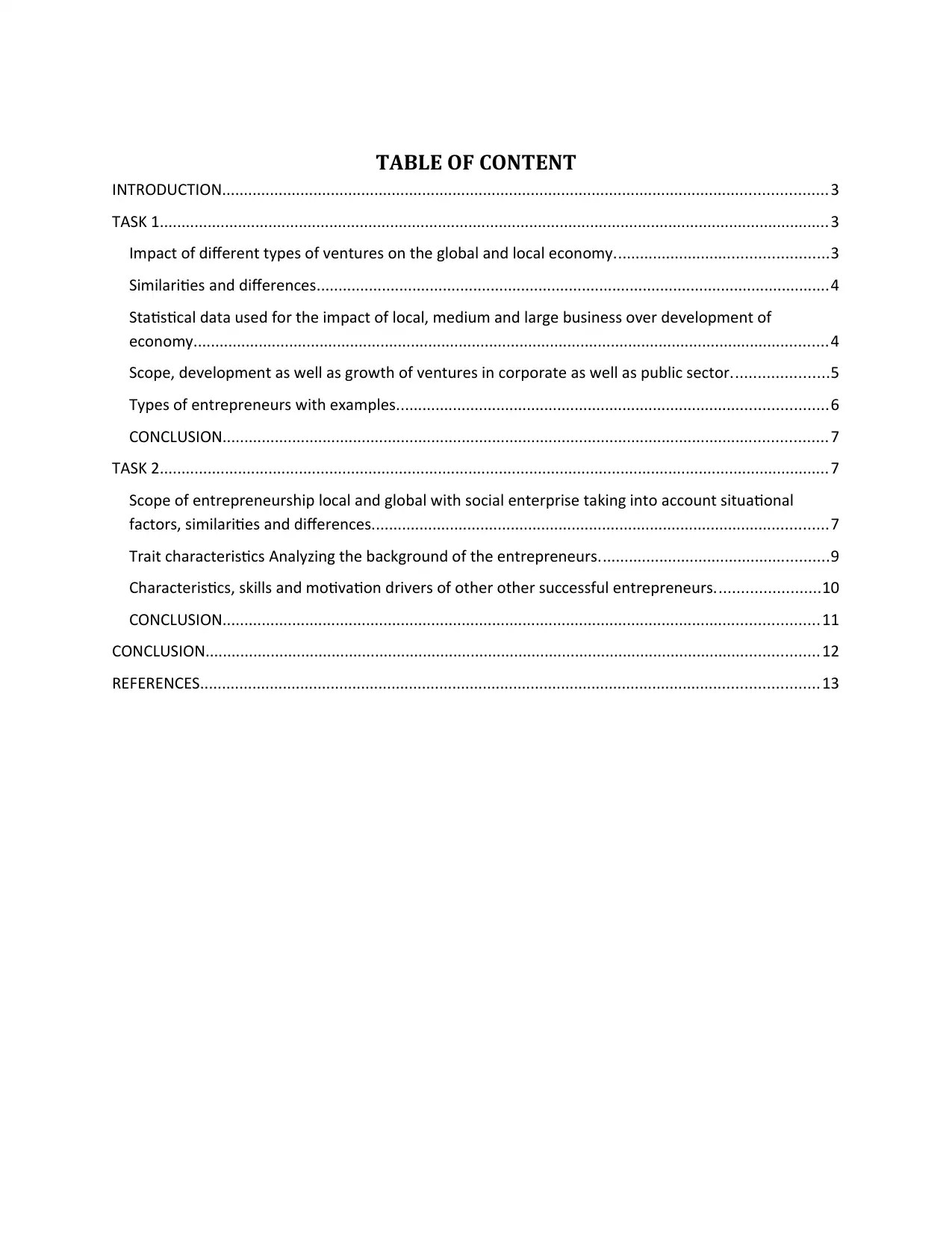
TABLE OF CONTENT
INTRODUCTION...........................................................................................................................................3
TASK 1..........................................................................................................................................................3
Impact of different types of ventures on the global and local economy.................................................3
Similarities and differences......................................................................................................................4
Statistical data used for the impact of local, medium and large business over development of
economy..................................................................................................................................................4
Scope, development as well as growth of ventures in corporate as well as public sector......................5
Types of entrepreneurs with examples...................................................................................................6
CONCLUSION...........................................................................................................................................7
TASK 2..........................................................................................................................................................7
Scope of entrepreneurship local and global with social enterprise taking into account situational
factors, similarities and differences.........................................................................................................7
Trait characteristics Analyzing the background of the entrepreneurs.....................................................9
Characteristics, skills and motivation drivers of other other successful entrepreneurs........................10
CONCLUSION.........................................................................................................................................11
CONCLUSION.............................................................................................................................................12
REFERENCES..............................................................................................................................................13
INTRODUCTION...........................................................................................................................................3
TASK 1..........................................................................................................................................................3
Impact of different types of ventures on the global and local economy.................................................3
Similarities and differences......................................................................................................................4
Statistical data used for the impact of local, medium and large business over development of
economy..................................................................................................................................................4
Scope, development as well as growth of ventures in corporate as well as public sector......................5
Types of entrepreneurs with examples...................................................................................................6
CONCLUSION...........................................................................................................................................7
TASK 2..........................................................................................................................................................7
Scope of entrepreneurship local and global with social enterprise taking into account situational
factors, similarities and differences.........................................................................................................7
Trait characteristics Analyzing the background of the entrepreneurs.....................................................9
Characteristics, skills and motivation drivers of other other successful entrepreneurs........................10
CONCLUSION.........................................................................................................................................11
CONCLUSION.............................................................................................................................................12
REFERENCES..............................................................................................................................................13
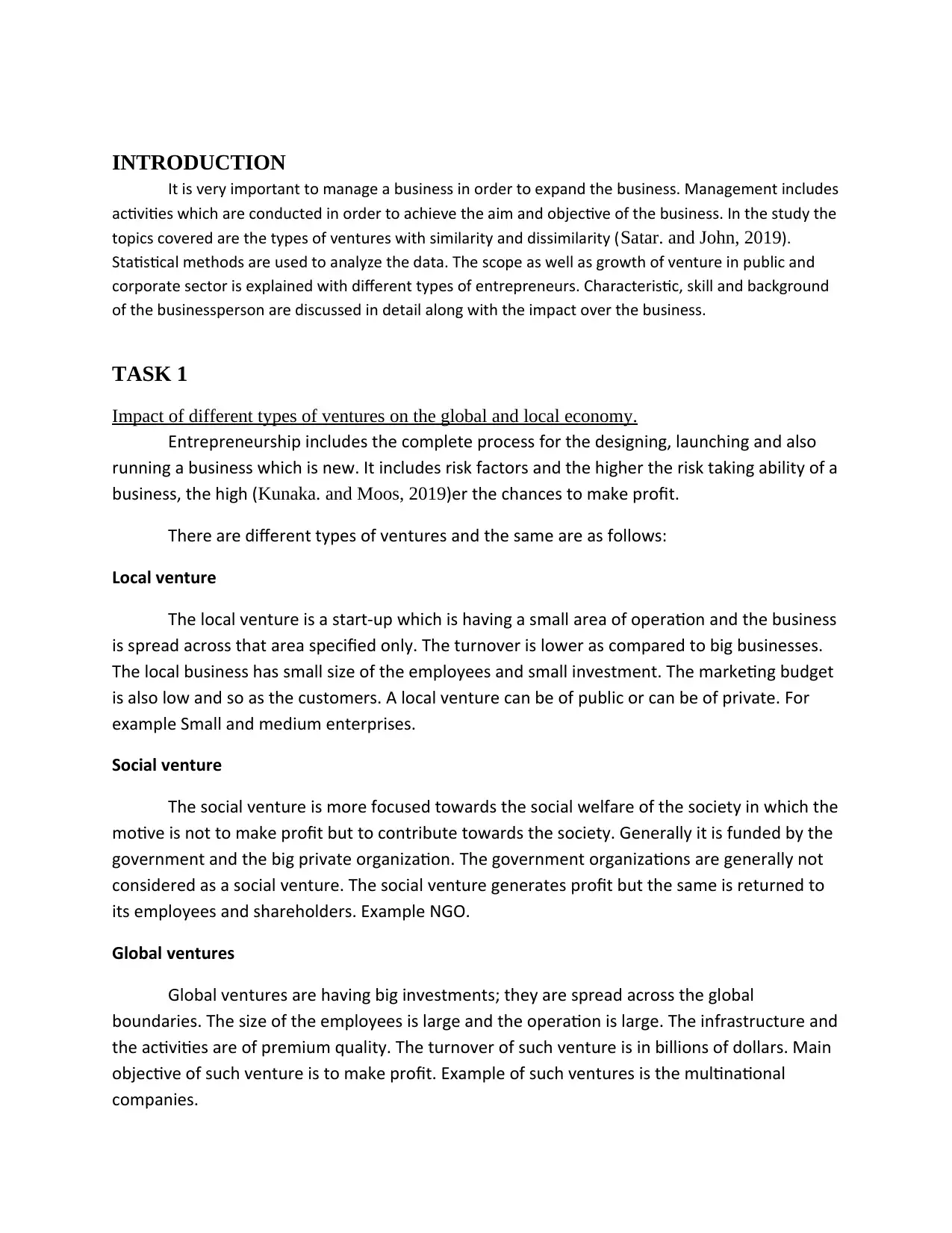
INTRODUCTION
It is very important to manage a business in order to expand the business. Management includes
activities which are conducted in order to achieve the aim and objective of the business. In the study the
topics covered are the types of ventures with similarity and dissimilarity (Satar. and John, 2019).
Statistical methods are used to analyze the data. The scope as well as growth of venture in public and
corporate sector is explained with different types of entrepreneurs. Characteristic, skill and background
of the businessperson are discussed in detail along with the impact over the business.
TASK 1
Impact of different types of ventures on the global and local economy.
Entrepreneurship includes the complete process for the designing, launching and also
running a business which is new. It includes risk factors and the higher the risk taking ability of a
business, the high (Kunaka. and Moos, 2019)er the chances to make profit.
There are different types of ventures and the same are as follows:
Local venture
The local venture is a start-up which is having a small area of operation and the business
is spread across that area specified only. The turnover is lower as compared to big businesses.
The local business has small size of the employees and small investment. The marketing budget
is also low and so as the customers. A local venture can be of public or can be of private. For
example Small and medium enterprises.
Social venture
The social venture is more focused towards the social welfare of the society in which the
motive is not to make profit but to contribute towards the society. Generally it is funded by the
government and the big private organization. The government organizations are generally not
considered as a social venture. The social venture generates profit but the same is returned to
its employees and shareholders. Example NGO.
Global ventures
Global ventures are having big investments; they are spread across the global
boundaries. The size of the employees is large and the operation is large. The infrastructure and
the activities are of premium quality. The turnover of such venture is in billions of dollars. Main
objective of such venture is to make profit. Example of such ventures is the multinational
companies.
It is very important to manage a business in order to expand the business. Management includes
activities which are conducted in order to achieve the aim and objective of the business. In the study the
topics covered are the types of ventures with similarity and dissimilarity (Satar. and John, 2019).
Statistical methods are used to analyze the data. The scope as well as growth of venture in public and
corporate sector is explained with different types of entrepreneurs. Characteristic, skill and background
of the businessperson are discussed in detail along with the impact over the business.
TASK 1
Impact of different types of ventures on the global and local economy.
Entrepreneurship includes the complete process for the designing, launching and also
running a business which is new. It includes risk factors and the higher the risk taking ability of a
business, the high (Kunaka. and Moos, 2019)er the chances to make profit.
There are different types of ventures and the same are as follows:
Local venture
The local venture is a start-up which is having a small area of operation and the business
is spread across that area specified only. The turnover is lower as compared to big businesses.
The local business has small size of the employees and small investment. The marketing budget
is also low and so as the customers. A local venture can be of public or can be of private. For
example Small and medium enterprises.
Social venture
The social venture is more focused towards the social welfare of the society in which the
motive is not to make profit but to contribute towards the society. Generally it is funded by the
government and the big private organization. The government organizations are generally not
considered as a social venture. The social venture generates profit but the same is returned to
its employees and shareholders. Example NGO.
Global ventures
Global ventures are having big investments; they are spread across the global
boundaries. The size of the employees is large and the operation is large. The infrastructure and
the activities are of premium quality. The turnover of such venture is in billions of dollars. Main
objective of such venture is to make profit. Example of such ventures is the multinational
companies.
⊘ This is a preview!⊘
Do you want full access?
Subscribe today to unlock all pages.

Trusted by 1+ million students worldwide
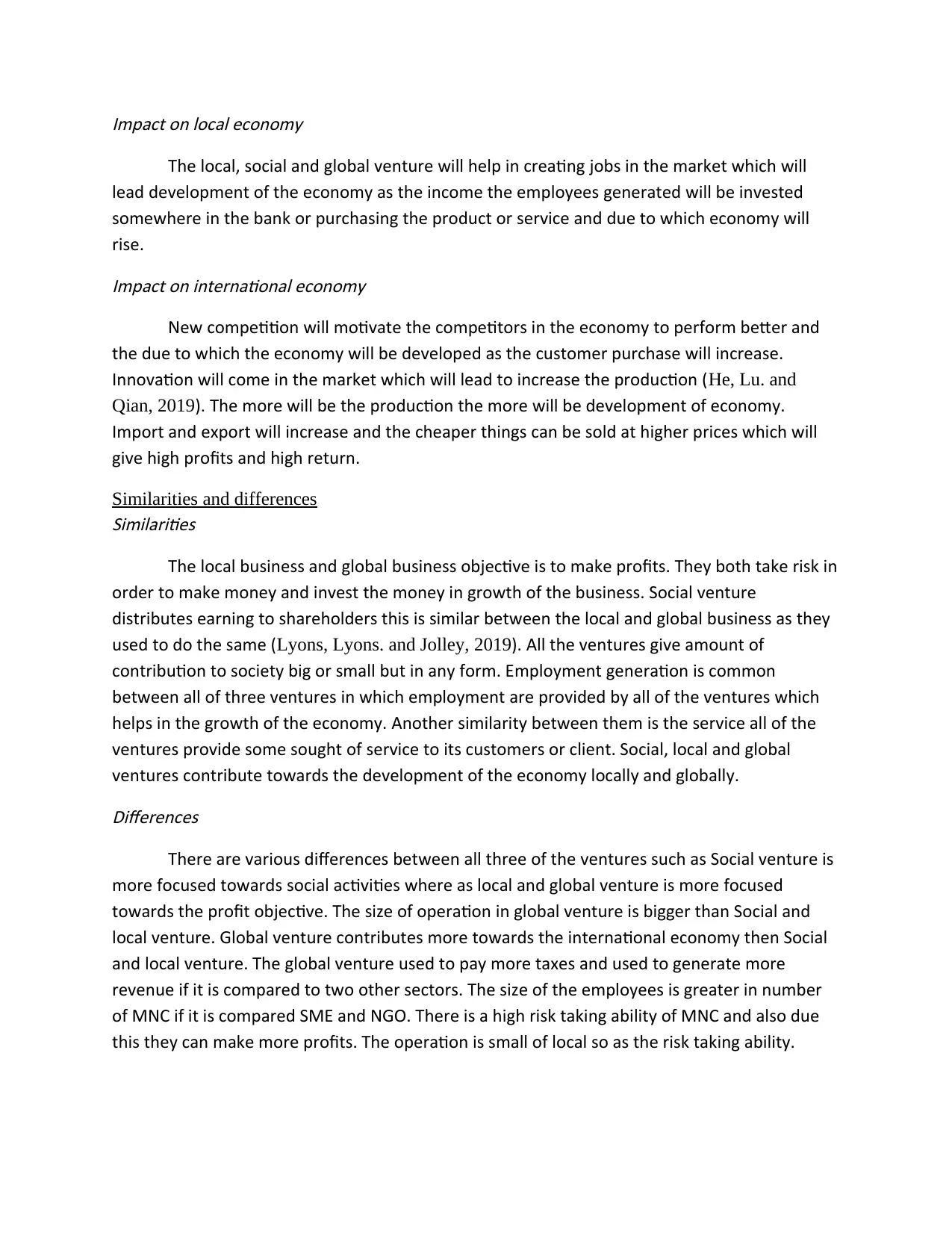
Impact on local economy
The local, social and global venture will help in creating jobs in the market which will
lead development of the economy as the income the employees generated will be invested
somewhere in the bank or purchasing the product or service and due to which economy will
rise.
Impact on international economy
New competition will motivate the competitors in the economy to perform better and
the due to which the economy will be developed as the customer purchase will increase.
Innovation will come in the market which will lead to increase the production (He, Lu. and
Qian, 2019). The more will be the production the more will be development of economy.
Import and export will increase and the cheaper things can be sold at higher prices which will
give high profits and high return.
Similarities and differencesSimilarities
The local business and global business objective is to make profits. They both take risk in
order to make money and invest the money in growth of the business. Social venture
distributes earning to shareholders this is similar between the local and global business as they
used to do the same (Lyons, Lyons. and Jolley, 2019). All the ventures give amount of
contribution to society big or small but in any form. Employment generation is common
between all of three ventures in which employment are provided by all of the ventures which
helps in the growth of the economy. Another similarity between them is the service all of the
ventures provide some sought of service to its customers or client. Social, local and global
ventures contribute towards the development of the economy locally and globally.
Differences
There are various differences between all three of the ventures such as Social venture is
more focused towards social activities where as local and global venture is more focused
towards the profit objective. The size of operation in global venture is bigger than Social and
local venture. Global venture contributes more towards the international economy then Social
and local venture. The global venture used to pay more taxes and used to generate more
revenue if it is compared to two other sectors. The size of the employees is greater in number
of MNC if it is compared SME and NGO. There is a high risk taking ability of MNC and also due
this they can make more profits. The operation is small of local so as the risk taking ability.
The local, social and global venture will help in creating jobs in the market which will
lead development of the economy as the income the employees generated will be invested
somewhere in the bank or purchasing the product or service and due to which economy will
rise.
Impact on international economy
New competition will motivate the competitors in the economy to perform better and
the due to which the economy will be developed as the customer purchase will increase.
Innovation will come in the market which will lead to increase the production (He, Lu. and
Qian, 2019). The more will be the production the more will be development of economy.
Import and export will increase and the cheaper things can be sold at higher prices which will
give high profits and high return.
Similarities and differencesSimilarities
The local business and global business objective is to make profits. They both take risk in
order to make money and invest the money in growth of the business. Social venture
distributes earning to shareholders this is similar between the local and global business as they
used to do the same (Lyons, Lyons. and Jolley, 2019). All the ventures give amount of
contribution to society big or small but in any form. Employment generation is common
between all of three ventures in which employment are provided by all of the ventures which
helps in the growth of the economy. Another similarity between them is the service all of the
ventures provide some sought of service to its customers or client. Social, local and global
ventures contribute towards the development of the economy locally and globally.
Differences
There are various differences between all three of the ventures such as Social venture is
more focused towards social activities where as local and global venture is more focused
towards the profit objective. The size of operation in global venture is bigger than Social and
local venture. Global venture contributes more towards the international economy then Social
and local venture. The global venture used to pay more taxes and used to generate more
revenue if it is compared to two other sectors. The size of the employees is greater in number
of MNC if it is compared SME and NGO. There is a high risk taking ability of MNC and also due
this they can make more profits. The operation is small of local so as the risk taking ability.
Paraphrase This Document
Need a fresh take? Get an instant paraphrase of this document with our AI Paraphraser
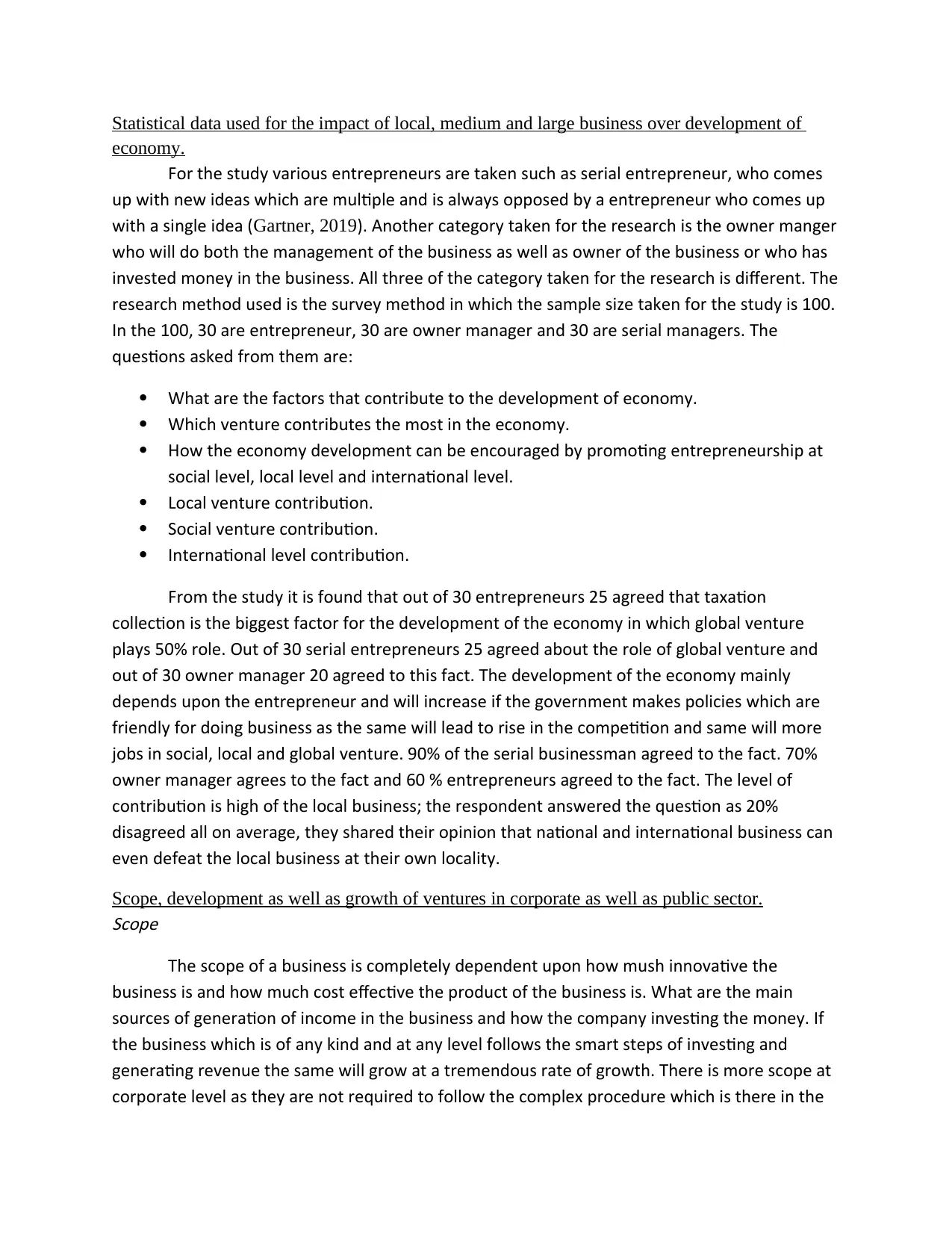
Statistical data used for the impact of local, medium and large business over development of
economy.
For the study various entrepreneurs are taken such as serial entrepreneur, who comes
up with new ideas which are multiple and is always opposed by a entrepreneur who comes up
with a single idea (Gartner, 2019). Another category taken for the research is the owner manger
who will do both the management of the business as well as owner of the business or who has
invested money in the business. All three of the category taken for the research is different. The
research method used is the survey method in which the sample size taken for the study is 100.
In the 100, 30 are entrepreneur, 30 are owner manager and 30 are serial managers. The
questions asked from them are:
What are the factors that contribute to the development of economy.
Which venture contributes the most in the economy.
How the economy development can be encouraged by promoting entrepreneurship at
social level, local level and international level.
Local venture contribution.
Social venture contribution.
International level contribution.
From the study it is found that out of 30 entrepreneurs 25 agreed that taxation
collection is the biggest factor for the development of the economy in which global venture
plays 50% role. Out of 30 serial entrepreneurs 25 agreed about the role of global venture and
out of 30 owner manager 20 agreed to this fact. The development of the economy mainly
depends upon the entrepreneur and will increase if the government makes policies which are
friendly for doing business as the same will lead to rise in the competition and same will more
jobs in social, local and global venture. 90% of the serial businessman agreed to the fact. 70%
owner manager agrees to the fact and 60 % entrepreneurs agreed to the fact. The level of
contribution is high of the local business; the respondent answered the question as 20%
disagreed all on average, they shared their opinion that national and international business can
even defeat the local business at their own locality.
Scope, development as well as growth of ventures in corporate as well as public sector.Scope
The scope of a business is completely dependent upon how mush innovative the
business is and how much cost effective the product of the business is. What are the main
sources of generation of income in the business and how the company investing the money. If
the business which is of any kind and at any level follows the smart steps of investing and
generating revenue the same will grow at a tremendous rate of growth. There is more scope at
corporate level as they are not required to follow the complex procedure which is there in the
economy.
For the study various entrepreneurs are taken such as serial entrepreneur, who comes
up with new ideas which are multiple and is always opposed by a entrepreneur who comes up
with a single idea (Gartner, 2019). Another category taken for the research is the owner manger
who will do both the management of the business as well as owner of the business or who has
invested money in the business. All three of the category taken for the research is different. The
research method used is the survey method in which the sample size taken for the study is 100.
In the 100, 30 are entrepreneur, 30 are owner manager and 30 are serial managers. The
questions asked from them are:
What are the factors that contribute to the development of economy.
Which venture contributes the most in the economy.
How the economy development can be encouraged by promoting entrepreneurship at
social level, local level and international level.
Local venture contribution.
Social venture contribution.
International level contribution.
From the study it is found that out of 30 entrepreneurs 25 agreed that taxation
collection is the biggest factor for the development of the economy in which global venture
plays 50% role. Out of 30 serial entrepreneurs 25 agreed about the role of global venture and
out of 30 owner manager 20 agreed to this fact. The development of the economy mainly
depends upon the entrepreneur and will increase if the government makes policies which are
friendly for doing business as the same will lead to rise in the competition and same will more
jobs in social, local and global venture. 90% of the serial businessman agreed to the fact. 70%
owner manager agrees to the fact and 60 % entrepreneurs agreed to the fact. The level of
contribution is high of the local business; the respondent answered the question as 20%
disagreed all on average, they shared their opinion that national and international business can
even defeat the local business at their own locality.
Scope, development as well as growth of ventures in corporate as well as public sector.Scope
The scope of a business is completely dependent upon how mush innovative the
business is and how much cost effective the product of the business is. What are the main
sources of generation of income in the business and how the company investing the money. If
the business which is of any kind and at any level follows the smart steps of investing and
generating revenue the same will grow at a tremendous rate of growth. There is more scope at
corporate level as they are not required to follow the complex procedure which is there in the
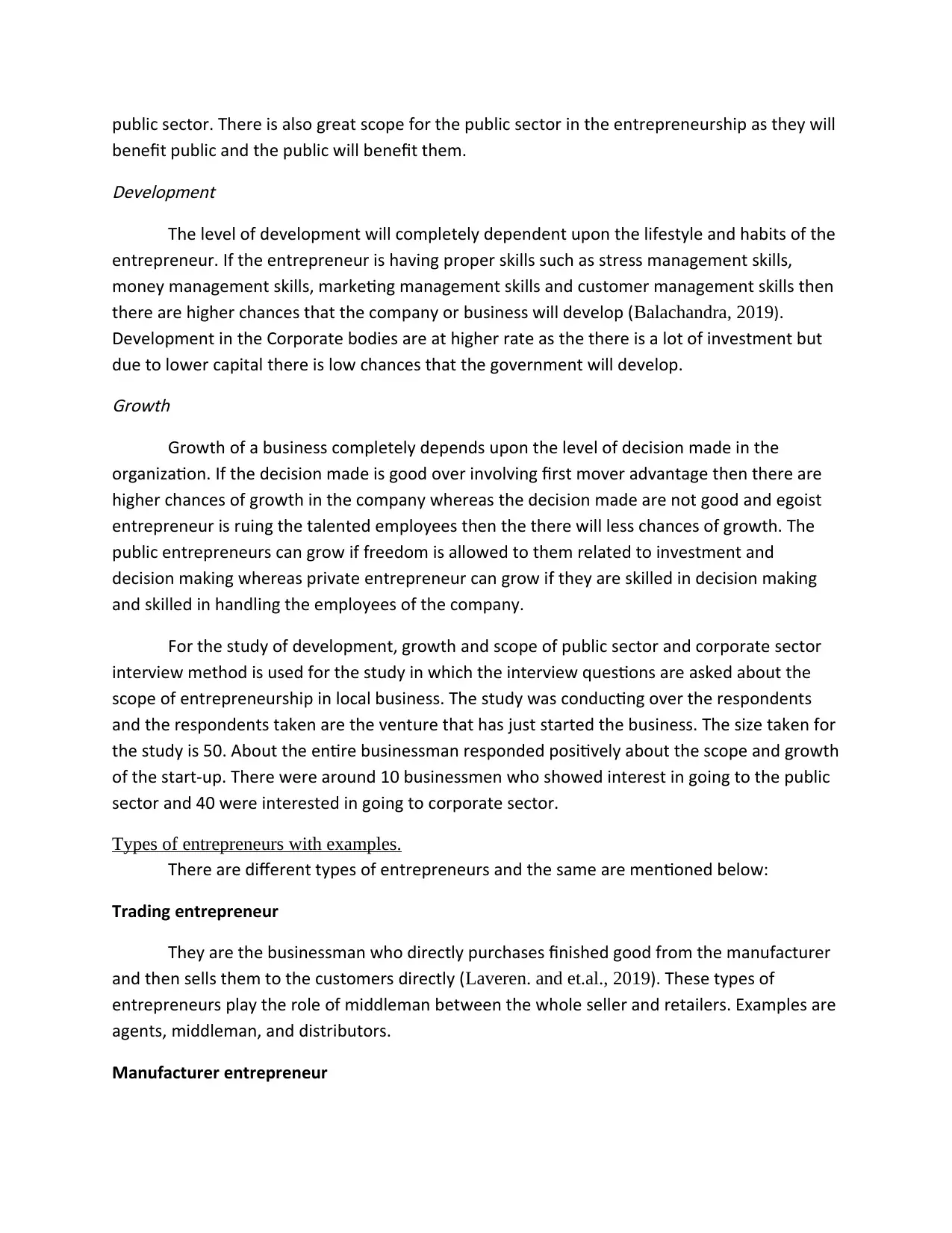
public sector. There is also great scope for the public sector in the entrepreneurship as they will
benefit public and the public will benefit them.
Development
The level of development will completely dependent upon the lifestyle and habits of the
entrepreneur. If the entrepreneur is having proper skills such as stress management skills,
money management skills, marketing management skills and customer management skills then
there are higher chances that the company or business will develop (Balachandra, 2019).
Development in the Corporate bodies are at higher rate as the there is a lot of investment but
due to lower capital there is low chances that the government will develop.
Growth
Growth of a business completely depends upon the level of decision made in the
organization. If the decision made is good over involving first mover advantage then there are
higher chances of growth in the company whereas the decision made are not good and egoist
entrepreneur is ruing the talented employees then the there will less chances of growth. The
public entrepreneurs can grow if freedom is allowed to them related to investment and
decision making whereas private entrepreneur can grow if they are skilled in decision making
and skilled in handling the employees of the company.
For the study of development, growth and scope of public sector and corporate sector
interview method is used for the study in which the interview questions are asked about the
scope of entrepreneurship in local business. The study was conducting over the respondents
and the respondents taken are the venture that has just started the business. The size taken for
the study is 50. About the entire businessman responded positively about the scope and growth
of the start-up. There were around 10 businessmen who showed interest in going to the public
sector and 40 were interested in going to corporate sector.
Types of entrepreneurs with examples.
There are different types of entrepreneurs and the same are mentioned below:
Trading entrepreneur
They are the businessman who directly purchases finished good from the manufacturer
and then sells them to the customers directly (Laveren. and et.al., 2019). These types of
entrepreneurs play the role of middleman between the whole seller and retailers. Examples are
agents, middleman, and distributors.
Manufacturer entrepreneur
benefit public and the public will benefit them.
Development
The level of development will completely dependent upon the lifestyle and habits of the
entrepreneur. If the entrepreneur is having proper skills such as stress management skills,
money management skills, marketing management skills and customer management skills then
there are higher chances that the company or business will develop (Balachandra, 2019).
Development in the Corporate bodies are at higher rate as the there is a lot of investment but
due to lower capital there is low chances that the government will develop.
Growth
Growth of a business completely depends upon the level of decision made in the
organization. If the decision made is good over involving first mover advantage then there are
higher chances of growth in the company whereas the decision made are not good and egoist
entrepreneur is ruing the talented employees then the there will less chances of growth. The
public entrepreneurs can grow if freedom is allowed to them related to investment and
decision making whereas private entrepreneur can grow if they are skilled in decision making
and skilled in handling the employees of the company.
For the study of development, growth and scope of public sector and corporate sector
interview method is used for the study in which the interview questions are asked about the
scope of entrepreneurship in local business. The study was conducting over the respondents
and the respondents taken are the venture that has just started the business. The size taken for
the study is 50. About the entire businessman responded positively about the scope and growth
of the start-up. There were around 10 businessmen who showed interest in going to the public
sector and 40 were interested in going to corporate sector.
Types of entrepreneurs with examples.
There are different types of entrepreneurs and the same are mentioned below:
Trading entrepreneur
They are the businessman who directly purchases finished good from the manufacturer
and then sells them to the customers directly (Laveren. and et.al., 2019). These types of
entrepreneurs play the role of middleman between the whole seller and retailers. Examples are
agents, middleman, and distributors.
Manufacturer entrepreneur
⊘ This is a preview!⊘
Do you want full access?
Subscribe today to unlock all pages.

Trusted by 1+ million students worldwide
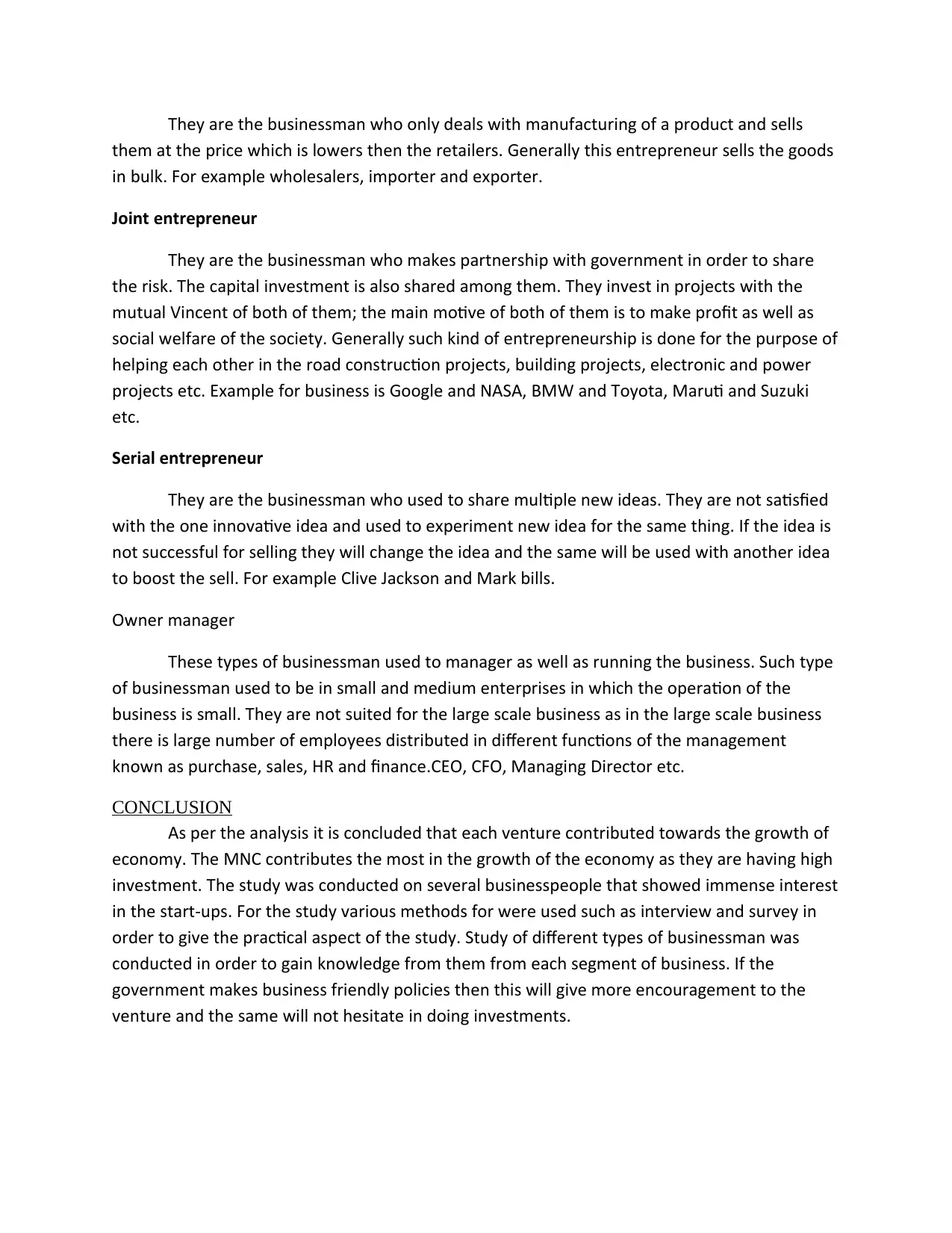
They are the businessman who only deals with manufacturing of a product and sells
them at the price which is lowers then the retailers. Generally this entrepreneur sells the goods
in bulk. For example wholesalers, importer and exporter.
Joint entrepreneur
They are the businessman who makes partnership with government in order to share
the risk. The capital investment is also shared among them. They invest in projects with the
mutual Vincent of both of them; the main motive of both of them is to make profit as well as
social welfare of the society. Generally such kind of entrepreneurship is done for the purpose of
helping each other in the road construction projects, building projects, electronic and power
projects etc. Example for business is Google and NASA, BMW and Toyota, Maruti and Suzuki
etc.
Serial entrepreneur
They are the businessman who used to share multiple new ideas. They are not satisfied
with the one innovative idea and used to experiment new idea for the same thing. If the idea is
not successful for selling they will change the idea and the same will be used with another idea
to boost the sell. For example Clive Jackson and Mark bills.
Owner manager
These types of businessman used to manager as well as running the business. Such type
of businessman used to be in small and medium enterprises in which the operation of the
business is small. They are not suited for the large scale business as in the large scale business
there is large number of employees distributed in different functions of the management
known as purchase, sales, HR and finance.CEO, CFO, Managing Director etc.
CONCLUSION
As per the analysis it is concluded that each venture contributed towards the growth of
economy. The MNC contributes the most in the growth of the economy as they are having high
investment. The study was conducted on several businesspeople that showed immense interest
in the start-ups. For the study various methods for were used such as interview and survey in
order to give the practical aspect of the study. Study of different types of businessman was
conducted in order to gain knowledge from them from each segment of business. If the
government makes business friendly policies then this will give more encouragement to the
venture and the same will not hesitate in doing investments.
them at the price which is lowers then the retailers. Generally this entrepreneur sells the goods
in bulk. For example wholesalers, importer and exporter.
Joint entrepreneur
They are the businessman who makes partnership with government in order to share
the risk. The capital investment is also shared among them. They invest in projects with the
mutual Vincent of both of them; the main motive of both of them is to make profit as well as
social welfare of the society. Generally such kind of entrepreneurship is done for the purpose of
helping each other in the road construction projects, building projects, electronic and power
projects etc. Example for business is Google and NASA, BMW and Toyota, Maruti and Suzuki
etc.
Serial entrepreneur
They are the businessman who used to share multiple new ideas. They are not satisfied
with the one innovative idea and used to experiment new idea for the same thing. If the idea is
not successful for selling they will change the idea and the same will be used with another idea
to boost the sell. For example Clive Jackson and Mark bills.
Owner manager
These types of businessman used to manager as well as running the business. Such type
of businessman used to be in small and medium enterprises in which the operation of the
business is small. They are not suited for the large scale business as in the large scale business
there is large number of employees distributed in different functions of the management
known as purchase, sales, HR and finance.CEO, CFO, Managing Director etc.
CONCLUSION
As per the analysis it is concluded that each venture contributed towards the growth of
economy. The MNC contributes the most in the growth of the economy as they are having high
investment. The study was conducted on several businesspeople that showed immense interest
in the start-ups. For the study various methods for were used such as interview and survey in
order to give the practical aspect of the study. Study of different types of businessman was
conducted in order to gain knowledge from them from each segment of business. If the
government makes business friendly policies then this will give more encouragement to the
venture and the same will not hesitate in doing investments.
Paraphrase This Document
Need a fresh take? Get an instant paraphrase of this document with our AI Paraphraser
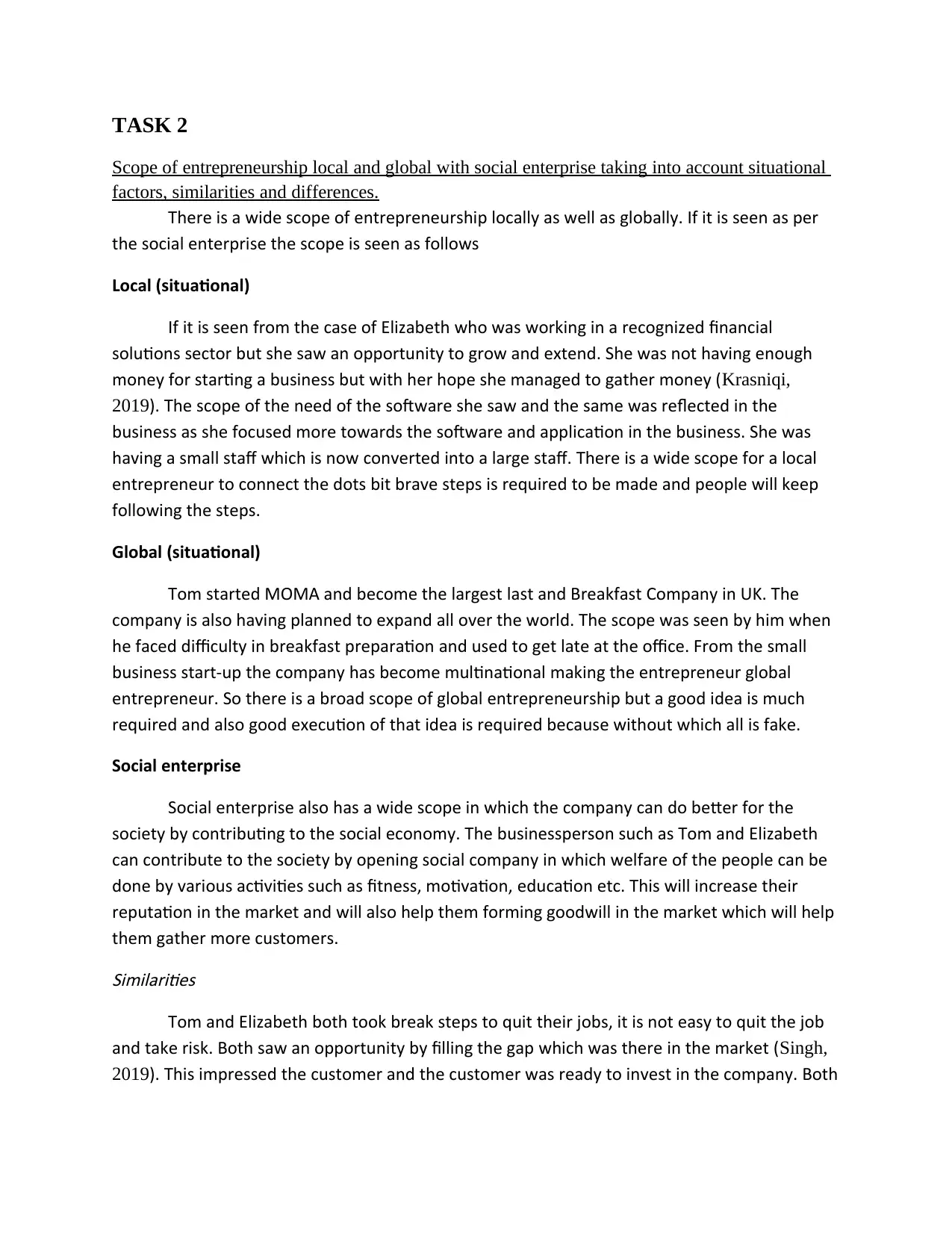
TASK 2
Scope of entrepreneurship local and global with social enterprise taking into account situational
factors, similarities and differences.
There is a wide scope of entrepreneurship locally as well as globally. If it is seen as per
the social enterprise the scope is seen as follows
Local (situational)
If it is seen from the case of Elizabeth who was working in a recognized financial
solutions sector but she saw an opportunity to grow and extend. She was not having enough
money for starting a business but with her hope she managed to gather money (Krasniqi,
2019). The scope of the need of the software she saw and the same was reflected in the
business as she focused more towards the software and application in the business. She was
having a small staff which is now converted into a large staff. There is a wide scope for a local
entrepreneur to connect the dots bit brave steps is required to be made and people will keep
following the steps.
Global (situational)
Tom started MOMA and become the largest last and Breakfast Company in UK. The
company is also having planned to expand all over the world. The scope was seen by him when
he faced difficulty in breakfast preparation and used to get late at the office. From the small
business start-up the company has become multinational making the entrepreneur global
entrepreneur. So there is a broad scope of global entrepreneurship but a good idea is much
required and also good execution of that idea is required because without which all is fake.
Social enterprise
Social enterprise also has a wide scope in which the company can do better for the
society by contributing to the social economy. The businessperson such as Tom and Elizabeth
can contribute to the society by opening social company in which welfare of the people can be
done by various activities such as fitness, motivation, education etc. This will increase their
reputation in the market and will also help them forming goodwill in the market which will help
them gather more customers.
Similarities
Tom and Elizabeth both took break steps to quit their jobs, it is not easy to quit the job
and take risk. Both saw an opportunity by filling the gap which was there in the market (Singh,
2019). This impressed the customer and the customer was ready to invest in the company. Both
Scope of entrepreneurship local and global with social enterprise taking into account situational
factors, similarities and differences.
There is a wide scope of entrepreneurship locally as well as globally. If it is seen as per
the social enterprise the scope is seen as follows
Local (situational)
If it is seen from the case of Elizabeth who was working in a recognized financial
solutions sector but she saw an opportunity to grow and extend. She was not having enough
money for starting a business but with her hope she managed to gather money (Krasniqi,
2019). The scope of the need of the software she saw and the same was reflected in the
business as she focused more towards the software and application in the business. She was
having a small staff which is now converted into a large staff. There is a wide scope for a local
entrepreneur to connect the dots bit brave steps is required to be made and people will keep
following the steps.
Global (situational)
Tom started MOMA and become the largest last and Breakfast Company in UK. The
company is also having planned to expand all over the world. The scope was seen by him when
he faced difficulty in breakfast preparation and used to get late at the office. From the small
business start-up the company has become multinational making the entrepreneur global
entrepreneur. So there is a broad scope of global entrepreneurship but a good idea is much
required and also good execution of that idea is required because without which all is fake.
Social enterprise
Social enterprise also has a wide scope in which the company can do better for the
society by contributing to the social economy. The businessperson such as Tom and Elizabeth
can contribute to the society by opening social company in which welfare of the people can be
done by various activities such as fitness, motivation, education etc. This will increase their
reputation in the market and will also help them forming goodwill in the market which will help
them gather more customers.
Similarities
Tom and Elizabeth both took break steps to quit their jobs, it is not easy to quit the job
and take risk. Both saw an opportunity by filling the gap which was there in the market (Singh,
2019). This impressed the customer and the customer was ready to invest in the company. Both
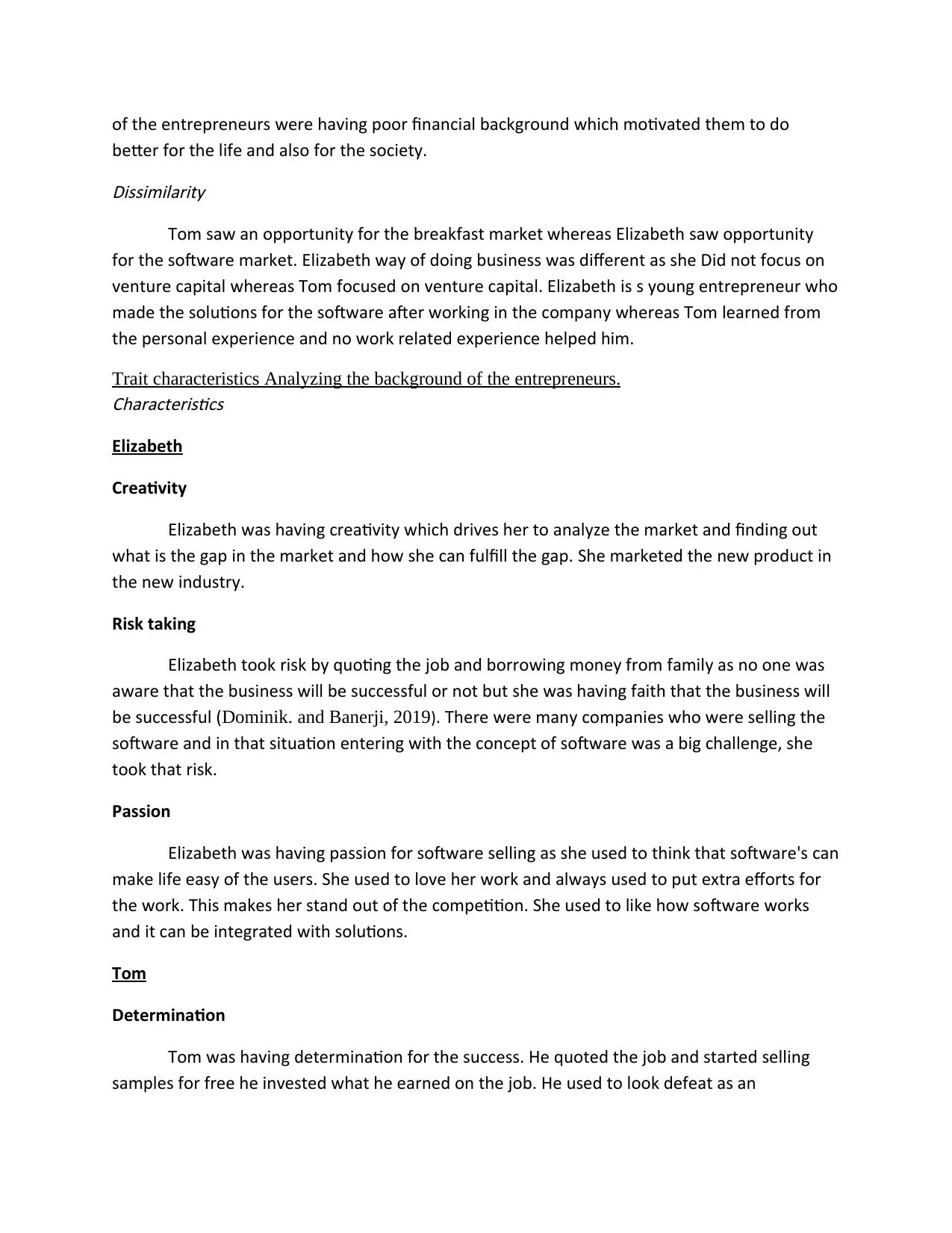
of the entrepreneurs were having poor financial background which motivated them to do
better for the life and also for the society.
Dissimilarity
Tom saw an opportunity for the breakfast market whereas Elizabeth saw opportunity
for the software market. Elizabeth way of doing business was different as she Did not focus on
venture capital whereas Tom focused on venture capital. Elizabeth is s young entrepreneur who
made the solutions for the software after working in the company whereas Tom learned from
the personal experience and no work related experience helped him.
Trait characteristics Analyzing the background of the entrepreneurs.Characteristics
Elizabeth
Creativity
Elizabeth was having creativity which drives her to analyze the market and finding out
what is the gap in the market and how she can fulfill the gap. She marketed the new product in
the new industry.
Risk taking
Elizabeth took risk by quoting the job and borrowing money from family as no one was
aware that the business will be successful or not but she was having faith that the business will
be successful (Dominik. and Banerji, 2019). There were many companies who were selling the
software and in that situation entering with the concept of software was a big challenge, she
took that risk.
Passion
Elizabeth was having passion for software selling as she used to think that software's can
make life easy of the users. She used to love her work and always used to put extra efforts for
the work. This makes her stand out of the competition. She used to like how software works
and it can be integrated with solutions.
Tom
Determination
Tom was having determination for the success. He quoted the job and started selling
samples for free he invested what he earned on the job. He used to look defeat as an
better for the life and also for the society.
Dissimilarity
Tom saw an opportunity for the breakfast market whereas Elizabeth saw opportunity
for the software market. Elizabeth way of doing business was different as she Did not focus on
venture capital whereas Tom focused on venture capital. Elizabeth is s young entrepreneur who
made the solutions for the software after working in the company whereas Tom learned from
the personal experience and no work related experience helped him.
Trait characteristics Analyzing the background of the entrepreneurs.Characteristics
Elizabeth
Creativity
Elizabeth was having creativity which drives her to analyze the market and finding out
what is the gap in the market and how she can fulfill the gap. She marketed the new product in
the new industry.
Risk taking
Elizabeth took risk by quoting the job and borrowing money from family as no one was
aware that the business will be successful or not but she was having faith that the business will
be successful (Dominik. and Banerji, 2019). There were many companies who were selling the
software and in that situation entering with the concept of software was a big challenge, she
took that risk.
Passion
Elizabeth was having passion for software selling as she used to think that software's can
make life easy of the users. She used to love her work and always used to put extra efforts for
the work. This makes her stand out of the competition. She used to like how software works
and it can be integrated with solutions.
Tom
Determination
Tom was having determination for the success. He quoted the job and started selling
samples for free he invested what he earned on the job. He used to look defeat as an
⊘ This is a preview!⊘
Do you want full access?
Subscribe today to unlock all pages.

Trusted by 1+ million students worldwide
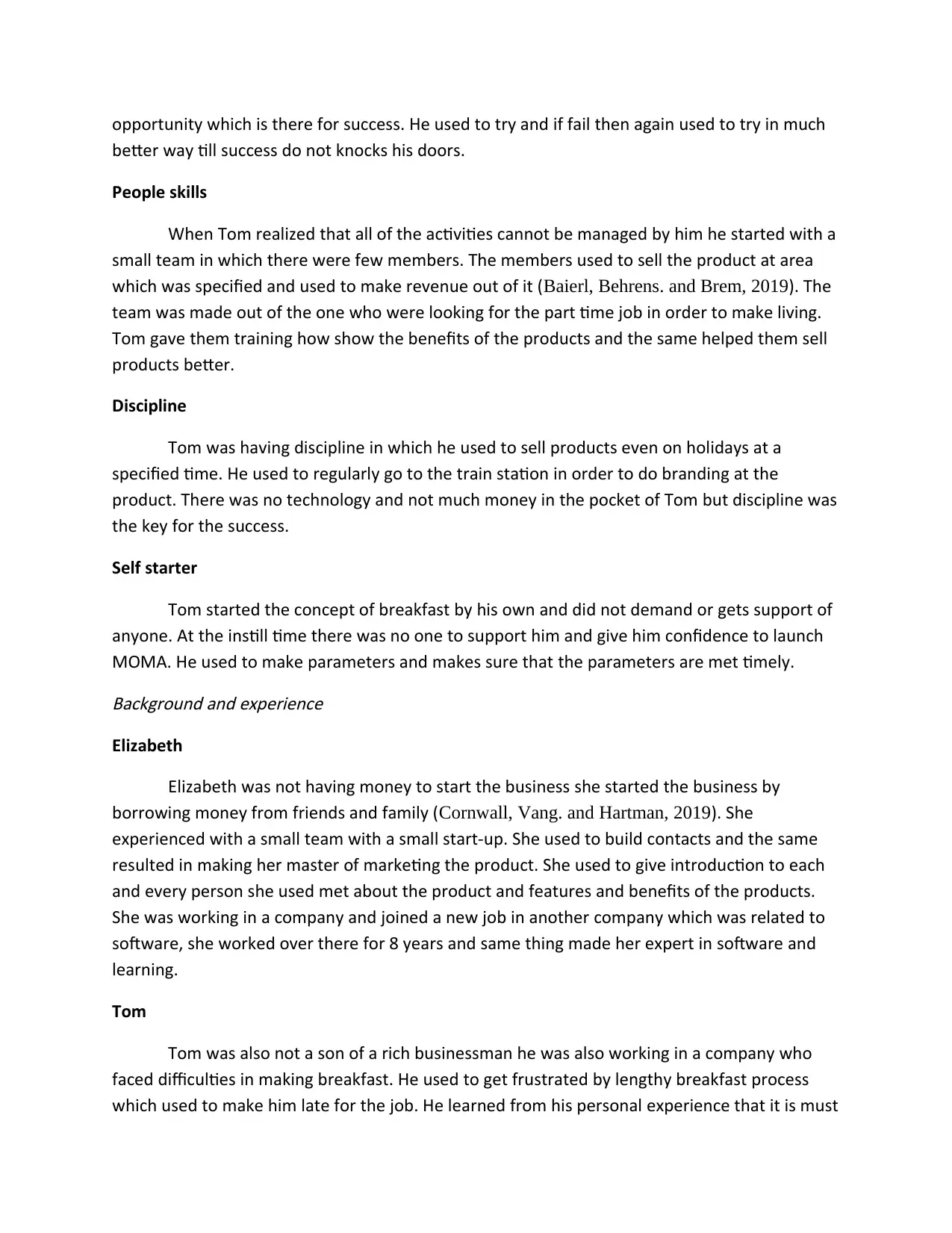
opportunity which is there for success. He used to try and if fail then again used to try in much
better way till success do not knocks his doors.
People skills
When Tom realized that all of the activities cannot be managed by him he started with a
small team in which there were few members. The members used to sell the product at area
which was specified and used to make revenue out of it (Baierl, Behrens. and Brem, 2019). The
team was made out of the one who were looking for the part time job in order to make living.
Tom gave them training how show the benefits of the products and the same helped them sell
products better.
Discipline
Tom was having discipline in which he used to sell products even on holidays at a
specified time. He used to regularly go to the train station in order to do branding at the
product. There was no technology and not much money in the pocket of Tom but discipline was
the key for the success.
Self starter
Tom started the concept of breakfast by his own and did not demand or gets support of
anyone. At the instill time there was no one to support him and give him confidence to launch
MOMA. He used to make parameters and makes sure that the parameters are met timely.
Background and experience
Elizabeth
Elizabeth was not having money to start the business she started the business by
borrowing money from friends and family (Cornwall, Vang. and Hartman, 2019). She
experienced with a small team with a small start-up. She used to build contacts and the same
resulted in making her master of marketing the product. She used to give introduction to each
and every person she used met about the product and features and benefits of the products.
She was working in a company and joined a new job in another company which was related to
software, she worked over there for 8 years and same thing made her expert in software and
learning.
Tom
Tom was also not a son of a rich businessman he was also working in a company who
faced difficulties in making breakfast. He used to get frustrated by lengthy breakfast process
which used to make him late for the job. He learned from his personal experience that it is must
better way till success do not knocks his doors.
People skills
When Tom realized that all of the activities cannot be managed by him he started with a
small team in which there were few members. The members used to sell the product at area
which was specified and used to make revenue out of it (Baierl, Behrens. and Brem, 2019). The
team was made out of the one who were looking for the part time job in order to make living.
Tom gave them training how show the benefits of the products and the same helped them sell
products better.
Discipline
Tom was having discipline in which he used to sell products even on holidays at a
specified time. He used to regularly go to the train station in order to do branding at the
product. There was no technology and not much money in the pocket of Tom but discipline was
the key for the success.
Self starter
Tom started the concept of breakfast by his own and did not demand or gets support of
anyone. At the instill time there was no one to support him and give him confidence to launch
MOMA. He used to make parameters and makes sure that the parameters are met timely.
Background and experience
Elizabeth
Elizabeth was not having money to start the business she started the business by
borrowing money from friends and family (Cornwall, Vang. and Hartman, 2019). She
experienced with a small team with a small start-up. She used to build contacts and the same
resulted in making her master of marketing the product. She used to give introduction to each
and every person she used met about the product and features and benefits of the products.
She was working in a company and joined a new job in another company which was related to
software, she worked over there for 8 years and same thing made her expert in software and
learning.
Tom
Tom was also not a son of a rich businessman he was also working in a company who
faced difficulties in making breakfast. He used to get frustrated by lengthy breakfast process
which used to make him late for the job. He learned from his personal experience that it is must
Paraphrase This Document
Need a fresh take? Get an instant paraphrase of this document with our AI Paraphraser
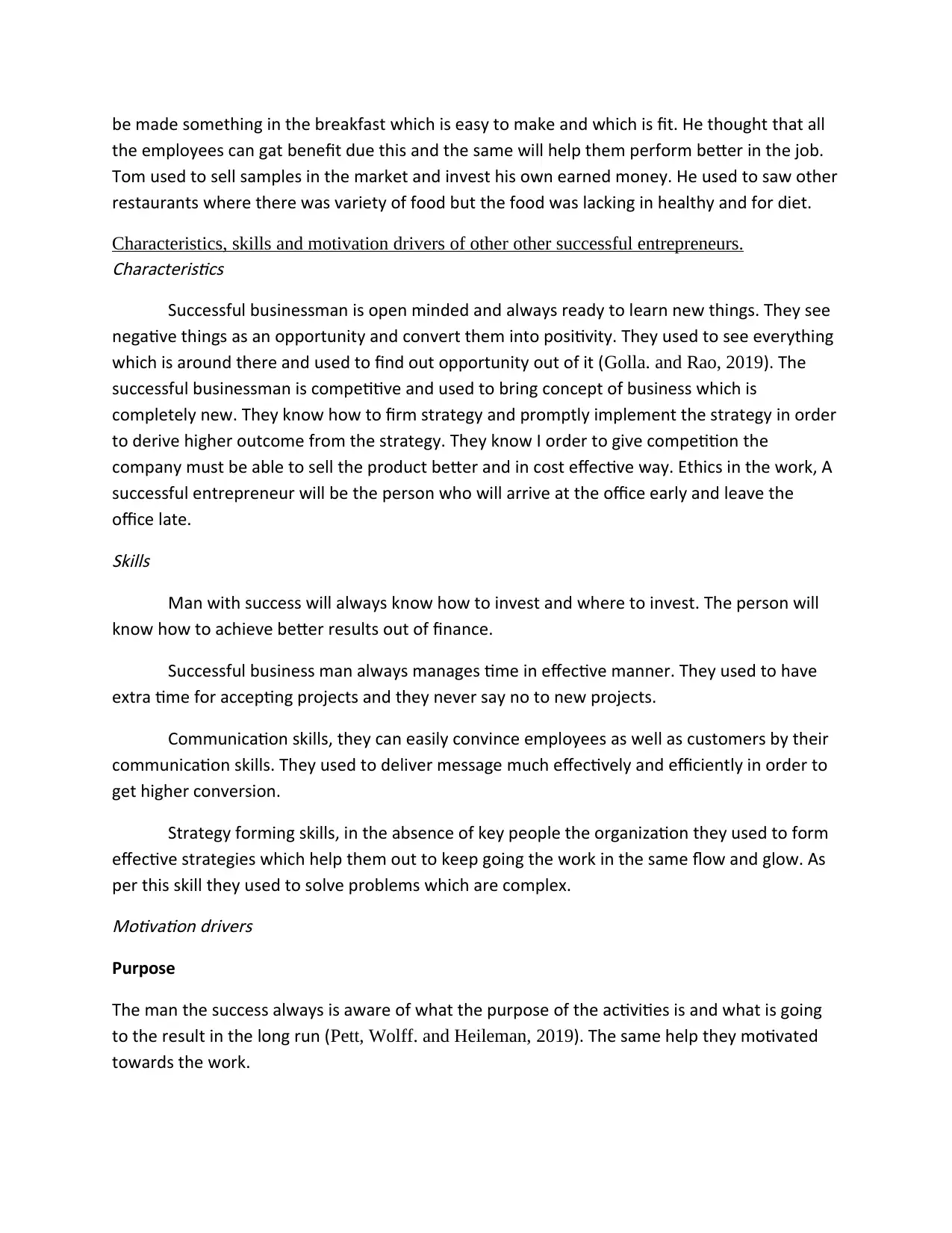
be made something in the breakfast which is easy to make and which is fit. He thought that all
the employees can gat benefit due this and the same will help them perform better in the job.
Tom used to sell samples in the market and invest his own earned money. He used to saw other
restaurants where there was variety of food but the food was lacking in healthy and for diet.
Characteristics, skills and motivation drivers of other other successful entrepreneurs.Characteristics
Successful businessman is open minded and always ready to learn new things. They see
negative things as an opportunity and convert them into positivity. They used to see everything
which is around there and used to find out opportunity out of it (Golla. and Rao, 2019). The
successful businessman is competitive and used to bring concept of business which is
completely new. They know how to firm strategy and promptly implement the strategy in order
to derive higher outcome from the strategy. They know I order to give competition the
company must be able to sell the product better and in cost effective way. Ethics in the work, A
successful entrepreneur will be the person who will arrive at the office early and leave the
office late.
Skills
Man with success will always know how to invest and where to invest. The person will
know how to achieve better results out of finance.
Successful business man always manages time in effective manner. They used to have
extra time for accepting projects and they never say no to new projects.
Communication skills, they can easily convince employees as well as customers by their
communication skills. They used to deliver message much effectively and efficiently in order to
get higher conversion.
Strategy forming skills, in the absence of key people the organization they used to form
effective strategies which help them out to keep going the work in the same flow and glow. As
per this skill they used to solve problems which are complex.
Motivation drivers
Purpose
The man the success always is aware of what the purpose of the activities is and what is going
to the result in the long run (Pett, Wolff. and Heileman, 2019). The same help they motivated
towards the work.
the employees can gat benefit due this and the same will help them perform better in the job.
Tom used to sell samples in the market and invest his own earned money. He used to saw other
restaurants where there was variety of food but the food was lacking in healthy and for diet.
Characteristics, skills and motivation drivers of other other successful entrepreneurs.Characteristics
Successful businessman is open minded and always ready to learn new things. They see
negative things as an opportunity and convert them into positivity. They used to see everything
which is around there and used to find out opportunity out of it (Golla. and Rao, 2019). The
successful businessman is competitive and used to bring concept of business which is
completely new. They know how to firm strategy and promptly implement the strategy in order
to derive higher outcome from the strategy. They know I order to give competition the
company must be able to sell the product better and in cost effective way. Ethics in the work, A
successful entrepreneur will be the person who will arrive at the office early and leave the
office late.
Skills
Man with success will always know how to invest and where to invest. The person will
know how to achieve better results out of finance.
Successful business man always manages time in effective manner. They used to have
extra time for accepting projects and they never say no to new projects.
Communication skills, they can easily convince employees as well as customers by their
communication skills. They used to deliver message much effectively and efficiently in order to
get higher conversion.
Strategy forming skills, in the absence of key people the organization they used to form
effective strategies which help them out to keep going the work in the same flow and glow. As
per this skill they used to solve problems which are complex.
Motivation drivers
Purpose
The man the success always is aware of what the purpose of the activities is and what is going
to the result in the long run (Pett, Wolff. and Heileman, 2019). The same help they motivated
towards the work.
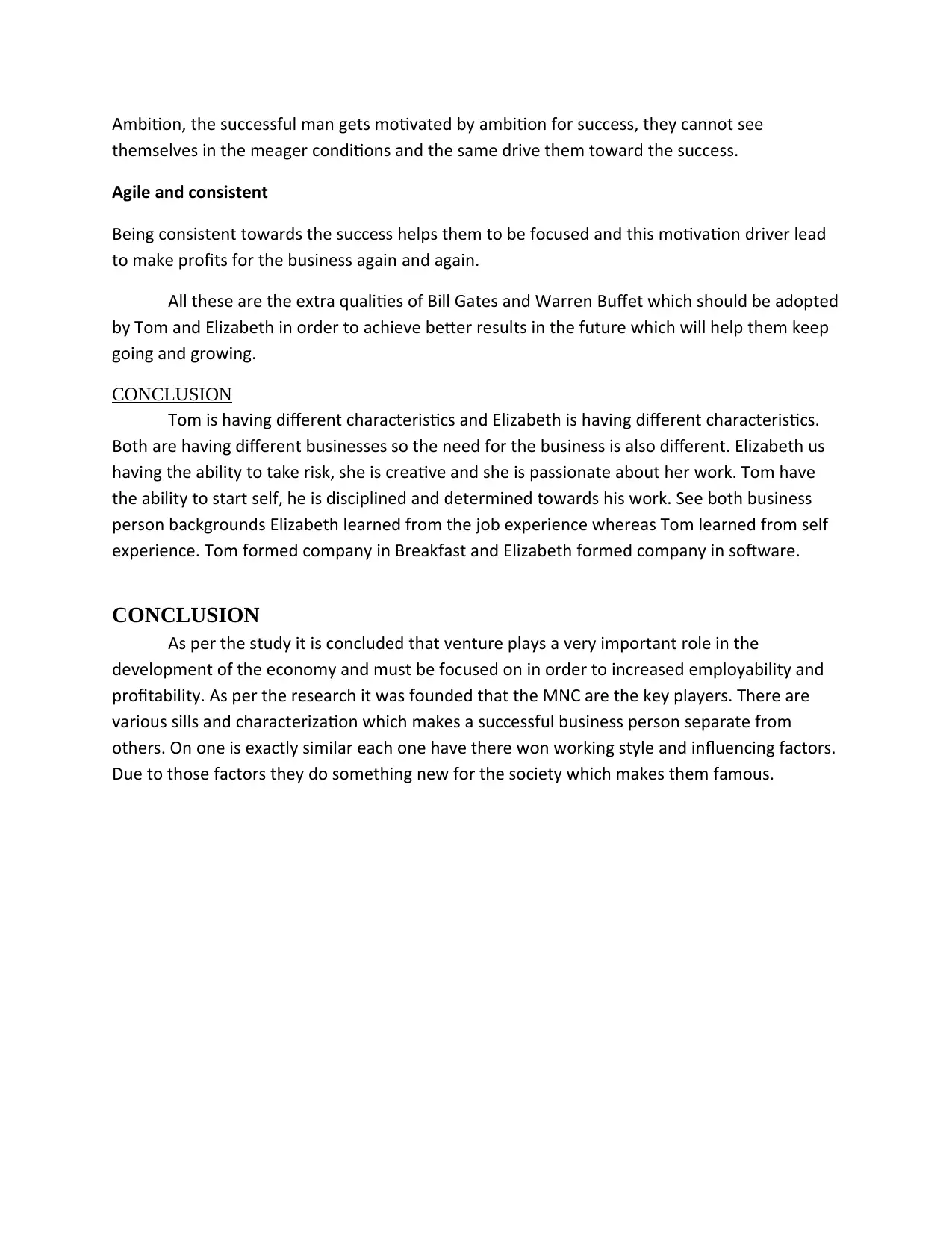
Ambition, the successful man gets motivated by ambition for success, they cannot see
themselves in the meager conditions and the same drive them toward the success.
Agile and consistent
Being consistent towards the success helps them to be focused and this motivation driver lead
to make profits for the business again and again.
All these are the extra qualities of Bill Gates and Warren Buffet which should be adopted
by Tom and Elizabeth in order to achieve better results in the future which will help them keep
going and growing.
CONCLUSION
Tom is having different characteristics and Elizabeth is having different characteristics.
Both are having different businesses so the need for the business is also different. Elizabeth us
having the ability to take risk, she is creative and she is passionate about her work. Tom have
the ability to start self, he is disciplined and determined towards his work. See both business
person backgrounds Elizabeth learned from the job experience whereas Tom learned from self
experience. Tom formed company in Breakfast and Elizabeth formed company in software.
CONCLUSION
As per the study it is concluded that venture plays a very important role in the
development of the economy and must be focused on in order to increased employability and
profitability. As per the research it was founded that the MNC are the key players. There are
various sills and characterization which makes a successful business person separate from
others. On one is exactly similar each one have there won working style and influencing factors.
Due to those factors they do something new for the society which makes them famous.
themselves in the meager conditions and the same drive them toward the success.
Agile and consistent
Being consistent towards the success helps them to be focused and this motivation driver lead
to make profits for the business again and again.
All these are the extra qualities of Bill Gates and Warren Buffet which should be adopted
by Tom and Elizabeth in order to achieve better results in the future which will help them keep
going and growing.
CONCLUSION
Tom is having different characteristics and Elizabeth is having different characteristics.
Both are having different businesses so the need for the business is also different. Elizabeth us
having the ability to take risk, she is creative and she is passionate about her work. Tom have
the ability to start self, he is disciplined and determined towards his work. See both business
person backgrounds Elizabeth learned from the job experience whereas Tom learned from self
experience. Tom formed company in Breakfast and Elizabeth formed company in software.
CONCLUSION
As per the study it is concluded that venture plays a very important role in the
development of the economy and must be focused on in order to increased employability and
profitability. As per the research it was founded that the MNC are the key players. There are
various sills and characterization which makes a successful business person separate from
others. On one is exactly similar each one have there won working style and influencing factors.
Due to those factors they do something new for the society which makes them famous.
⊘ This is a preview!⊘
Do you want full access?
Subscribe today to unlock all pages.

Trusted by 1+ million students worldwide
1 out of 13
Related Documents
Your All-in-One AI-Powered Toolkit for Academic Success.
+13062052269
info@desklib.com
Available 24*7 on WhatsApp / Email
![[object Object]](/_next/static/media/star-bottom.7253800d.svg)
Unlock your academic potential
Copyright © 2020–2025 A2Z Services. All Rights Reserved. Developed and managed by ZUCOL.



